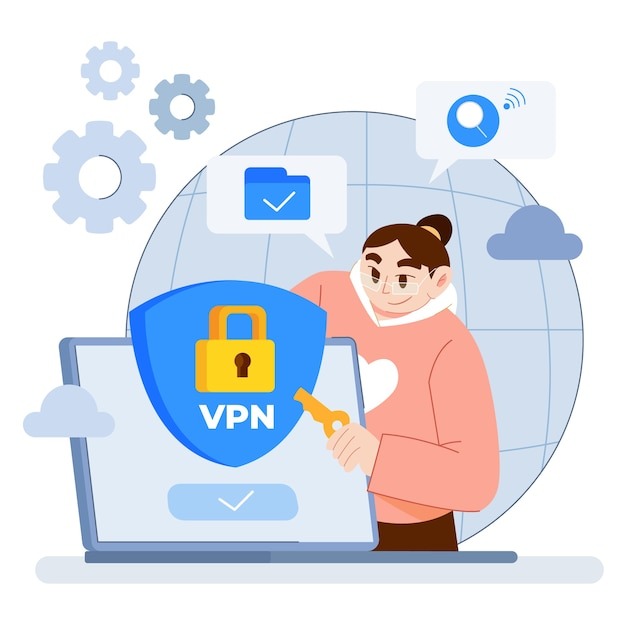Virtual Private Networks (VPNs) have become essential tools for internet users seeking enhanced privacy and security. In my experience, understanding how VPN encryption works and the associated security features can empower individuals to make informed decisions. In this guide, I will break down the complexities of VPN encryption and security into digestible parts.
✅ Current deal: 🔥 Get NordVPN with up to 75% OFF! 🔥

What is a VPN?
A VPN is a service that creates a secure connection between your device and the internet. Using a VPN, your internet traffic is routed through a dedicated server, which masks your IP address and encrypts your data. This makes it difficult for anyone to intercept your data, adding a layer of protection against hackers, government surveillance, and various forms of cyber threats.
How VPN Encryption Works
At the heart of VPN technology lies encryption. Encryption transforms data into a coded format that is unreadable to anyone who does not possess the appropriate decryption key. VPN encryption protects your online activities by ensuring that even if your data is intercepted, it cannot be easily understood.
Types of VPN Encryption Protocols
Several encryption protocols are commonly used by VPN providers. Each protocol offers different levels of security and performance. Here are a few of the main types:
- OpenVPN: An open-source protocol known for its strong security. It offers excellent flexibility and works well on various platforms.
- L2TP/IPsec: While L2TP provides a secure tunnel, it is often paired with IPsec to enhance encryption. This combination is reliable for security.
- IKEv2/IPsec: This protocol is particularly useful for mobile devices, offering quick reconnection times and reliable security.
- WireGuard: A newer protocol known for its simplicity and speed. It aims to offer robust security and better performance than older protocols.
- PPTP: An older protocol that is faster but offers weaker security. It is generally not recommended for sensitive data.
I personally prefer OpenVPN due to its versatility and security features. It provides a great balance of performance and protection.
VPN Encryption Strength
The strength of encryption is measured in bits. The higher the number of bits, the stronger the encryption. Common encryption levels include:
- 128-bit encryption: Suitable for basic privacy needs, but not the best for sensitive information.
- 256-bit encryption: The industry standard for privacy and security. It is virtually unbreakable by current computational capabilities.
When choosing a VPN, I always recommend one that supports 256-bit encryption to ensure maximum security.
Importance of VPN Security Features
Apart from encryption, several security features can further enhance your online safety when using a VPN. Some important ones include:
- Kill Switch: This feature disconnects your internet connection if the VPN is interrupted, preventing data leaks.
- DNS Leak Protection: Ensures that your DNS queries are not exposed outside the VPN tunnel.
- Split Tunneling: Allows you to choose which apps or websites go through the VPN and which use your regular internet connection.
- Multi-Hop Connections: Routes your data through multiple servers for added security.
- Ad and Malware Blocking: Protection against unwanted ads and malicious software.
I find that a VPN with these features offers a comprehensive approach to online privacy.
The Role of Authentication
Proper authentication measures are vital in VPN security. VPNs should employ robust authentication methods, such as:
- Username and Password: The most basic form of authentication, but should be strong.
- Multi-Factor Authentication (MFA): Adds an extra layer of security by requiring additional verification steps.
- Certificate-Based Authentication: Uses digital certificates for a more secure connection.
I strongly advocate for using MFA wherever possible, as it significantly bolsters account security.
Limitations of VPNs
While VPNs are effective for enhancing security and privacy, they are not a silver bullet. Here are some limitations:
- Not Completely Anonymous: Your VPN provider has access to your connection logs. Choosing a reputable provider with a strict no-logs policy is essential.
- Potential for Data Leaks: Misconfigurations can lead to DNS leaks, exposing your activity.
- Slower Connection Speeds: The additional layer of encryption can impact browsing speeds.
I have encountered these limitations firsthand and always recommend assessing your VPN needs against these factors.
✅ Current deal: 🔥 Get NordVPN with up to 75% OFF! 🔥
Tips for Maximizing VPN Security
To ensure you use your VPN as securely as possible, consider the following tips:
- Choose a Reputable Provider: Research providers that are transparent about their encryption methods and logging policies.
- Enable All Security Features: Make use of the kill switch, DNS leak protection, and other features offered.
- Regularly Update Your VPN: Keep your VPN client updated to benefit from the latest security patches.
- Use Strong Passwords: Create complex passwords and change them regularly. Consider using a password manager.
- Beware of Free VPNs: Often, free services monetize your data. Select a paid option with a trustworthy reputation.
By following these guidelines, I have managed to maintain a high level of online security in my own practices.
Conclusion
Understanding VPN encryption and security features is essential for anyone looking to protect their online activities. Knowledge of how encryption works, the importance of authentication, and the tips provided can greatly enhance your internet security. I encourage everyone to be proactive about their online safety by choosing a reliable VPN provider and incorporating complementary security practices. The internet can be a dangerous place, but with the right tools, I firmly believe that you can navigate it safely and securely.
Affiliate Disclosure: By clicking on our links, we may earn commissions at no additional cost to you.